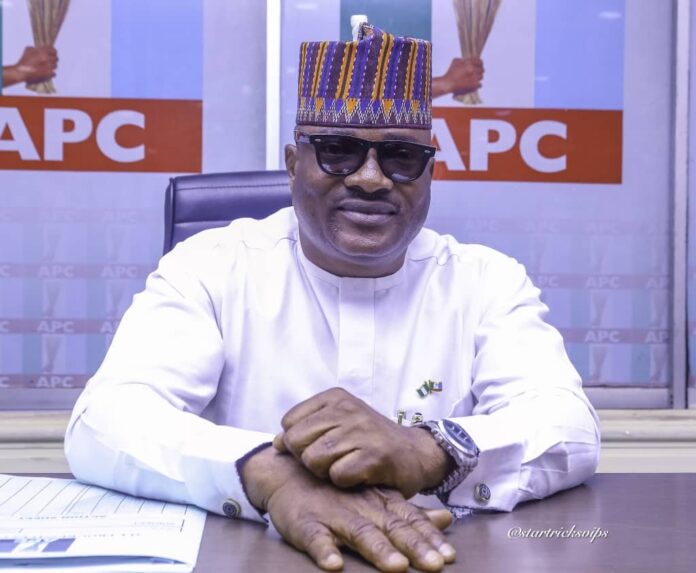In a powerful and impassioned statement, Aare Hon Tolu Bankole, the National Leader of Persons With Disabilities (PWDs) within the All Progressives Congress (APC), called on the Nigerian government to prioritize the political inclusion of PWDs in the forthcoming local government elections. His appeal underscores a crucial issue at the intersection of democracy, justice, and human rights in Nigeria.
Bankole’s statement, released on Friday, emphasized the need for a comprehensive approach to political inclusion, highlighting it as a matter of justice and equality. He argued that the inclusion of PWDs is essential not only for moral and ethical reasons but also for the enrichment of Nigeria’s democratic processes and governance structures.
The Legal Framework: Discrimination Against Persons With Disabilities (Prohibition) Act, 2018
Central to Bankole’s argument is the Discrimination Against Persons With Disabilities (Prohibition) Act, 2018. This landmark legislation mandates the protection and inclusion of PWDs in all aspects of public life, including political participation. The act represents a significant step forward in the fight against discrimination and the promotion of equal opportunities for PWDs in Nigeria.
Bankole pointed out that despite the legal framework, the practical implementation of these protections remains inconsistent. He urged government officials at all levels to adhere to the provisions of the act, ensuring that PWDs have equitable access to political processes and opportunities.
The Benefits of Inclusion: A Richer Democracy
In his statement, Bankole articulated the numerous benefits of including PWDs in political processes. He argued that the inclusion of PWDs brings diverse perspectives to the table, which is essential for crafting policies that are truly representative of all segments of society. “When PWDs are involved in decision-making processes, policies and programs are more likely to address the diverse needs of all citizens,” Bankole stated.
He further elaborated that the presence of PWDs in politics promotes social cohesion by breaking down barriers and stereotypes. This, in turn, fosters a more inclusive society where diversity is celebrated rather than marginalized. By integrating PWDs into the political landscape, Nigeria can enhance the quality of its governance and policy outcomes, making them more responsive to the needs of all citizens.
A Call to Action for Governors and Political Leaders
Bankole’s message was also a direct call to action for governors and political leaders across Nigeria. He urged them to take proactive steps to ensure the inclusion of PWDs in the upcoming local government elections. This, he suggested, could be achieved through overt support for PWD candidates, mentorship programs, and the appointment of PWDs into leadership positions.
“I urge your Excellencies to take proactive steps to ensure that PWDs are not only included but actively encouraged to participate in the upcoming local government elections,” Bankole implored. His call to action is a reminder that political inclusion is not just about legal compliance but also about creating an environment that actively supports and nurtures the participation of marginalized groups.
Navigating Current Challenges: A Call for Restraint and Dialogue
In light of the economic hardships currently facing Nigeria, Bankole also addressed the planned nationwide protests. He called for restraint and peaceful dialogue, urging Nigerians to express their grievances in a manner that does not escalate into violence or unrest. “While it is crucial to express our grievances and demand accountability, it is equally important to ensure that our actions do not escalate into violence or unrest,” he cautioned.
A Vision for an Inclusive Political Landscape
Bankole’s statement concluded with a hopeful vision for the future. He expressed confidence that with concerted efforts from political leaders, Nigeria could achieve a more inclusive and equitable political landscape. Such a transformation, he noted, would not only uphold the rights and dignity of PWDs but also set a powerful example for other countries in the region.
As Nigeria approaches its local government elections, Bankole’s call for political inclusion serves as a timely reminder of the importance of embracing diversity in governance. By ensuring that PWDs are represented in political processes, Nigeria can strengthen its democracy and create a more just and equitable society for all its citizens.
In the context of Nigeria’s broader socio-political challenges, the call for the inclusion of PWDs is not just about fulfilling a legal mandate; it is about realizing the full potential of democracy. It is about ensuring that every Nigerian, regardless of their physical or mental abilities, has a voice in the decisions that affect their lives. As such, the inclusion of PWDs in politics is not just a goal; it is a necessity for the country’s progress and development.
Bankole’s advocacy is a clarion call to action for all stakeholders in Nigeria’s political landscape. It is a call to embrace inclusivity, promote equality, and ensure that every citizen has the opportunity to participate fully in the democratic process. In doing so, Nigeria can not only uphold the principles of justice and equality but also build a stronger, more cohesive society.


